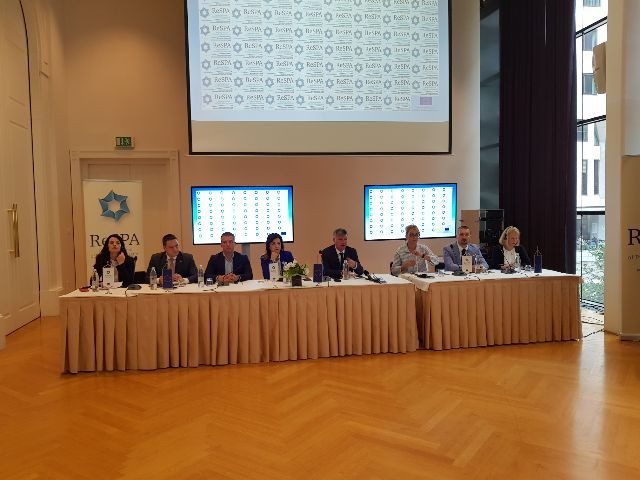Ljubljana hosts high Western Balkan participants

press conference | Author SOJ MJU
In his opening address, Minister Rudi Medved said that “all the people gathered share a common history. We have gone through different socio-political systems. We had a common state administration. Eighty years of common history also, of course, present some common challenges in public administration. And if the European Union is based on the connection of countries, with different administrations, the countries in the region share a common history and tradition in the field of bureaucracy” Medved said and continued to express his satisfaction that good cooperation with the Western Balkan countries remains a Slovenian foreign political priority.
The importance of ReSPA in the light of public administration reforms in the Western Balkan countries was underlined by its Chair Damjan Manchevski, who is also the Minister of Northern Macedonia for the Information Society and Public Administration. Northern Macedonia is also paying special attention to the challenges of public administration and digitization through new projects.
Ritva Heikkinen, the representative of European Comission said that the Commission is very pleased to be part of this high-level policy dialogue on public administration reform hosted by the Slovenian Minister for Public Administration Reform and organised by ReSPA. Acording to Heikkinen, this is a unique opportunity to take stock of past five years of public administration reform implementation in the Western Balkans and discuss about the priorities for the future. Heikkinen also stressed that public administration reform is a long-term commitment. Partner governments, especially of the same region may face similar challenges. In this context is very important to exchange of information with other peer institutions that are implementing or underwent similar reforms in the past on their road to adhesion.
ReSPA Director Ratka Sekulovic underlined the excellent collaboration of ReSPA with many institutions and organizations within the region and beyond. In May 2017, ReSPA also signed a Memorandum of Understanding with the Slovenian Ministry of Public Administration. According to Sekulovic, the document is proof that a high-level dialogue is taking place in the region.
At the event, Serbian Minister of Public Administration and Local Self-Government Branko Ruzic stressed that ReSPA has provided a network of people working for the same thing: to create a public administration that is a professional, modern and efficient public service provider for citizens. Through this network, they can share good practices and experiences so that they can more easily cope with obstacles. Minister Ruzic thanked his Slovenian counterparts for the opportunity to learn from them, adding that this support is so important to them because of Slovenia's EU integration process. Serbia has done a great deal in the field of digitization to relieve its citizens. They also invest in their people. They create a fair, transparent and motivational workspace. Citizens and entrepreneurs are facing a more efficient public administration, this means they are on track.
In his address, Josip Grubesa, Minister of Justice of Bosnia and Herzegovina, drew attention to the fact that the meeting was organized in cooperation with the Ministry of Public Administration of the Republic of Slovenia, Member States of the European Union. Slovenian colleagues wholeheartedly share Slovenia's experience in the process of modernizing public administration, which is a clear signal that the EU Member States, with their experience and knowledge in the reform process, are very willing to help the Western Balkan countries. According to Grubesa, Bosnia and Herzegovina still faces many challenges when it comes to public administration reform, in particular in terms of lack of political will and readiness, as well as capacity for substantive reform. It is therefore of the utmost importance to ensure such meetings, as the Minister believes that through regional cooperation and through joint regional activities, they can achieve much more and overcome the obstacles they face.
Montenegrin Minister Suzana Pribilovic highlighted significant progress in public administration reform. A better level of democracy and the alignment of the legal system with European law has contributed to this. Minister Pribilovic acknowledged ReSPA's support and support for Montenegro's more efficient public administration. Minister Pribilovic said that public administration reform is one of the key areas in the European integration process and is also an important segment for improving the quality of citizens.
Albana Koçiu, Director of the Department of Public Administration in Albania, said that Public Administration Reform is always part of the conversation, especially when we talk about what Albanian needs to achieve in order to become part of the EU. According to Koçiu, Albania is at a point in time where it is patiently waiting at the stop light, hoping for the green light. The work ahead will surely be difficult and it will require all of their efforts but they look forward to it.
After the introductory presentations, Slovenian experts will present the experience in the field of public administration reform, the remuneration system of civil servants and their training, as well as eGovernment and public procurement.
In the afternoon high-level guests will also provide their input on the topics, namely ReSPA Chair and North Macedonia Minister for Information Society and Public Administration Damjan Manchevski, ReSPA Director Ratka Sekulović, Minister of Justice of Bosnia and Herzegovina Josip Grubeša, Montenegrin Minister Suzana Pribilović and Serbian Minister for Public government and local self-government Branko Ružić, representatives of the European Commission and other high-level guests.
ReSPA (Regional School of Public Administration) is an international organization based in Montenegro. It was established in 2011. Its members are Albania, Bosnia and Herzegovina, Montenegro, Macedonia and Serbia. The international organization has been set up to improve regional cooperation, promote shared learning and support the development of public administration in the countries of the region and thereby integrate into the EU.
It is currently chaired by North Macedonia.

